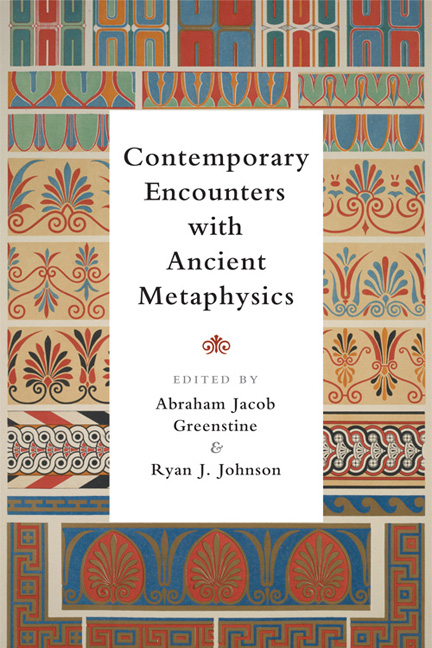Book contents
- Frontmatter
- Contents
- Acknowledgements
- Note on the Text
- Notes on Contributors
- 1 A Thousand Antiquities
- Part I Plato
- Part II Aristotle
- Part III Epicureans, Stoics, Skeptics, and Neo-Platonists
- 13 Lucretius and Naturalism [1961]
- 14 On Causality and Law in Lucretius and Contemporary Cosmology
- 15 On the Surface: The Deleuze-Stoicism Encounter
- 16 Contingency and Skepticism in Agamben's Thought
- 17 Plotinus’ “Reverse” Platonism: A Deleuzian Response to the Problem of Emanation Imagery
- Part IV Postscript
- Index
16 - Contingency and Skepticism in Agamben's Thought
from Part III - Epicureans, Stoics, Skeptics, and Neo-Platonists
- Frontmatter
- Contents
- Acknowledgements
- Note on the Text
- Notes on Contributors
- 1 A Thousand Antiquities
- Part I Plato
- Part II Aristotle
- Part III Epicureans, Stoics, Skeptics, and Neo-Platonists
- 13 Lucretius and Naturalism [1961]
- 14 On Causality and Law in Lucretius and Contemporary Cosmology
- 15 On the Surface: The Deleuze-Stoicism Encounter
- 16 Contingency and Skepticism in Agamben's Thought
- 17 Plotinus’ “Reverse” Platonism: A Deleuzian Response to the Problem of Emanation Imagery
- Part IV Postscript
- Index
Summary
Skepticism is often understood in terms of its epistemological implications alone, namely that we cannot have any certain knowledge. Throughout the history of philosophy, skepticism has been an important partner in conversation for exactly its epistemological position – if only to reject what many consider its unwanted outcomes. In the work of Giorgio Agamben, however, we find another way of retrieving some of the basic terms and concerns of ancient skepticism for ontology. Agamben shows that the skeptic's philosophical vocabulary allows us to articulate an alternative to both the affirmation of being characteristic of ontotheology, as well as the negation of being that characterizes contemporary forms of nihilism.
In this essay, I explore how Agamben retrieves ancient skepticism and how this skepticism informs some of his basic concepts. While Agamben sometimes explicitly refers to the infl uence of skepticism, at other occasions, his arguments and thoughts are merely marked by several skeptical traces which need to be brought out in a reading of his texts; it is worthwhile to consider both. To examine the skeptical heritage of Agamben's work and its implication for, especially, his accounts of contingency and potentiality which form the heart of his ontological concerns, in this contribution I discuss three different elements: (1) the skeptic formulae, and in particular Agamben's account of ἐποχή and οὐ μᾶƛƛον; (2) the skeptic passage that may be traced in his usage of the word εὐπορία, which requires some contextualization to understand its meaning and its skeptic kinship; (3) the skeptic overtones in Agamben's reading of the Pauline notion of καταργεῖν, deactivation or suspension.
THE SKEPTIC FORMULA
One of the most important references to skepticism can be found in Agamben's essay “Bartleby, or on Contingency.”1 This complicated essay offers a reading of Herman Melville's story Bartleby, the Scrivener in which this story becomes a special kind of experiment, an experiment in ontology. As Agamben explains:
Not only science, but also poetry and thinking conduct experiments. These experiments do not simply concern the truth or falsity of hypotheses, the occurrence or nonoccurrence of something, as in scientific experiments; rather, they call into question Being itself, before or beyond its determination as true or false. These experiments are without truth, for truth is what is at issue in them.2
- Type
- Chapter
- Information
- Contemporary Encounters with Ancient Metaphysics , pp. 289 - 304Publisher: Edinburgh University PressPrint publication year: 2017



